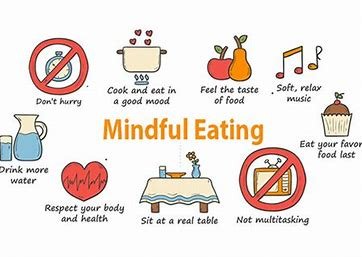Mindful eating is a practice that involves being fully present and attentive to the experience of eating. It encourages a holistic approach to nutrition by promoting awareness of the body’s hunger and fullness cues, the flavors and textures of food, and the emotional and psychological aspects of eating.

1. Slow Down:
- Take Your Time: Eat slowly and savor each bite. This allows you to appreciate the flavors and textures of your food fully.
- Chew Thoroughly: Chewing food thoroughly aids digestion and helps you feel more satisfied with your meal.
2. Pay Attention to Hunger and Fullness:
- Listen to Your Body: Eat when you are hungry and stop when you are satisfied, not when you are overly full.
- Hunger Cues: Learn to recognize your body’s hunger cues, such as a growling stomach or feeling low on energy.
3. Remove Distractions:
- Focus on Your Meal: Turn off the TV, put away your phone, and create a calm eating environment.
- Be Present: Engage all your senses in the eating experience—look at your food, smell it, taste it, and notice its texture.
4. Appreciate Your Food:
- Gratitude: Take a moment to appreciate the effort that went into growing, preparing, and cooking your food.
- Connection: Consider the origins of your food and the people involved in bringing it to your table.
5. Understand Your Cravings:
- Emotional Eating: Recognize when you are eating out of boredom, stress, or emotion rather than true hunger.
- Healthy Alternatives: Find healthier ways to cope with emotions, such as going for a walk, practicing meditation, or talking to a friend.
6. Eat Nutrient-Dense Foods:
- Whole Foods: Choose whole, unprocessed foods that nourish your body and provide essential nutrients.
- Balanced Meals: Include a balance of proteins, healthy fats, and complex carbohydrates to keep you energized and satisfied.
7. Portion Control:
- Mindful Portions: Serve appropriate portion sizes and avoid eating directly from packages, which can lead to overeating.
- Visual Cues: Use smaller plates and bowls to help control portion sizes visually.
8. Reflect on Your Eating Habits:
- Self-Awareness: Reflect on your eating habits and patterns, and identify areas for improvement.
- Journaling: Keep a food journal to track what you eat, how you feel, and any patterns that emerge.
Benefits of Mindful Eating:
- Improved Digestion: Eating slowly and mindfully can enhance digestion and nutrient absorption.
- Weight Management: Mindful eating can help prevent overeating and support healthy weight management.
- Greater Satisfaction: By fully experiencing your meals, you may find greater satisfaction and enjoyment in eating.
- Reduced Stress: Mindful eating can reduce stress and anxiety around food and eating habits.
Practical Tips:
- Start Small: Begin with one mindful meal or snack per day and gradually incorporate mindful eating into more meals.
- Be Patient: Developing mindful eating habits takes time and practice. Be patient with yourself and enjoy the journey.
